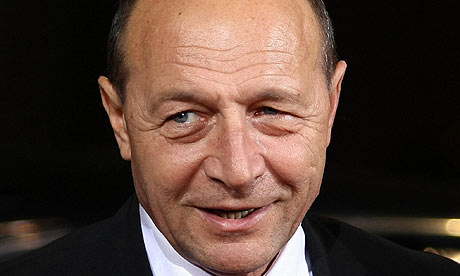
Hot Issue — Voice of Russia Campaigns for Removal of Romanian President Basescu
By:

Executive Summary
While the Romanian state has been struggling with a constitutional crisis pitting President Traian Basescu against the Social-Liberal Union (SLU) government of Victor Ponta, the Kremlin mouthpiece Voice of Russia has increasingly been instigating and drawing out the conflict. President Basescu survived the referendum on his removal due to low turnout, but Ponta’s government continues to uphold the President’s suspension. The constitutional crisis has drawn widespread criticism in the West, while Voice of Russia has repeatedly and harshly attacked the embattled Basescu, alleging the President’s record was deleterious to Romania’s political, economic, security and foreign policy interests, as well as urged the SLU to hastily remove Basescu from power. However, as the Ponta government has been unable to complete its full ouster of Basescu, Moscow seems to be losing its patience with the SLU, and may simply be content with maintaining political uncertainty in Romania for as long as possible.
Romania is experiencing a constitutional crisis and a crisis of governance in recent months, on top of the three-year-old economic crisis. A new government is occupied with amassing formal and informal powers for its own politicians and removing the Western-oriented President Traian Basescu from office, ahead of parliamentary elections. Basescu’s team has brought Romania into close alignment with the United States. But his firm support for anti-crisis austerity measures has sapped his popularity. Romania’s pro-Western political consensus looks more fragile with the crisis, and Moscow is instigating Basescu’s opponents to remove him from office, although he has more than two years to go in his presidential term.
Brussels and Washington are expressing serious concerns about Romania’s political crisis. On August 12, US Assistant Secretary of State Philip Gordon flew to Bucharest for an emergency visit, demonstrating support for Basescu’s stand on the constitution. State Department spokeswoman Victoria Nuland and the US Ambassador to Romania Mark Gitenstein have repeatedly cautioned the new government against further transgressions of the constitutional framework. European Commission President Manuel Barroso, European Justice Commissioner Viviane Reding, German Chancellor Angela Merkel and Foreign Affairs Minister Guido Westerwelle, and Council of Europe officials are among those who expressed concern. The European Commission has made public a list of 11 transgressions of the constitution, urging corrective steps. The US State Department has declared its full agreement with the EU on this score. Widely publicized by Romanian media, those Western criticisms have forced the new government on the defensive internationally, but not domestically.
Russia is encouraging the new government in Bucharest to press harder for Basescu’s removal. Moscow seeks to exploit this crisis as an opportunity to change Romania’s foreign and economic policies. According to widespread reports in the Romanian press, a group of parliamentarians from Basescu’s party defected to the other camp in April, when a familiar Russian political operative visited them. This move toppled the government by shifting the parliamentary majority toward the Social-Liberal Union (SLU), a coalition comprised of the Social-Democrat Party (SDP) and the National-Liberal Party (NLP).
SLU’s top leaders are not “pro-Russia” (no Romanian politician would fit that description); but neither are they associated with a value-based Western orientation. The Social-Democrat party has all but marginalized its former leader, the staunchly pro-Western Mircea Geoana, who in a New York Times op-ed (August 3) rose above the fray to caution against the USL’s “blitzkrieg, changing laws and institutions.” NATO, the EU and close partnership with the United States are the bedrock of Foreign Policy for Basescu’s team ever since it took office in 2004. The SLU’s inexperienced leaders have yet to prove themselves on that account; but their all-absorbing priority at this stage is to consolidate and re-distribute power after their lean opposition years. They tend to react petulantly to objections from Western officials. Russia is encouraging the new government to act that way. Moscow is cheering the new government along (see below).
The new government under Victor Ponta started out by appointing Andrei Marga Minister of Foreign Affairs who called for a unilateral Romanian rapprochement with Russia and who praised President Vladimir Putin as being superior to European leaders. Marga, a philosophy professor with no foreign policy experience, was dropped after several months, in one of the new government’s constant reshuffles. Questions persist about the real considerations behind that decorative appointment.
On July 6, the new parliamentary majority voted to suspend President Basescu from office and to hold a referendum on July 29 on Basescu’s removal from office. No charges are filed against him; his presidential term expires in late 2014; he proposed all along a European-type “cohabitation” arrangement of president and government belonging to different parties. However, the USL team decided to capture the state presidency for National-Liberal leader Crin Antonescu as fast as possible, in preparation for the November 2012 parliamentary elections. Basescu had lost his popularity with voters as a result of severe austerity measures implemented during his presidency. However, he survived the referendum: although 88 percent of the votes cast were against him, the voter turnout at 47 percent fell short of the 50 percent quorum. Nevertheless, Antonescu has become interim head of state while Basescu remains suspended from office, pending a solution to the constitutional crisis. The SLU is trying to change the rules of the game, including the quorum rule, and remove Basescu anyway, but the party hesitates in the face of Western criticism.
The Voice of Russia (hereafter VR) has played an important role during the referendum, and continues to do so as the crisis unfolds. This is unprecedented in Romania, a country in which Russian propaganda is traditionally mocked without being listened to. This time around, however, the Romanian political elite of all colors pays attention because this Russian government outlet is campaigning for the USL government, against Basescu and against Western influence in Romania.
VR’s main line of attack consists of identifying Basescu with Western-inspired policies and depict those policies across the board as contravening Romania’s national interests. On that basis, Voice of Russia has urged Basescu’s opponents to mobilize against him and change Romania’s policies (www.ruv.ru; www.romanian.ruvr.ru).
“Traian Basescu has been a perfect vassal to the United States. He sent troops to Iraq and Afghanistan, allowed the anti-missile shield to be installed, turned Romania into a priority target for Russia’s nuclear missiles, launched verbal attacks against Russia, and promoted American interests in European decision-making institutions….Basescu [is] the ideal, indeed perfect, US vassal” (VR, July 12).
“A success for Basescu would result in a territorial conquest by European supporters of US military programs in Eastern Europe. US Ambassador Mark Gitenstein’s critical statements against the Ponta government […] are in line with American political-military interests in Eastern Europe, those interests that Basescu has loyally served. [Romania’s] national interests are no longer being pursued in the country through its institutions, but are closely subordinated to trans-Atlantic interests” (VR, July 24).
“Because of Basescu’s and Romanian diplomacy’s grave errors, Romanian consumers pay the highest price in the EU for Russian natural gas” (VR, July 30).
“Romania’s political class and society [have been] extremely servile toward the European Commission and IMF, executing any orders from them unconditionally, and without a negative reaction from the population… But the referendum demonstrated that servility toward European institutions has some limits” (VR, August 2).
“The highest treason is Romania’s enslavement to the European Union and the United States” (VR, August 3).
Voice of Russia has egged on the SLU leaders while chiding them for insufficient firmness:
“If [the SLU] had resisted foreign pressures regarding the quorum, Traian Basescu would have been deposed. The SLU team still has real chances to remove Basescu, but it must act forcefully, not in a defeatist way… The Constitutional Court can point to foreign interference as an argument for validating the referendum even short of a quorum. Ultimately, there is the option of organizing street protests. If SLU politicians are passive and accept the idea of ‘cohabitation,’ their popular support will quickly disappear. [The] SLU leaders’s behavior will show whether they would betray their voters’ trust and hopes, or will carry on the political struggle with its risks and its benefits until the end” (VR, July 30).
Moscow might, however, be content with Basescu being suspended indefinitely, rather than removed outright, in which case Romania’s constitutional crisis would drag out. Moscow purports to instruct the government and constitutional court:
“The referendum must be validated. The Constitutional Court must choose between formalism and realism. Traian Basescu is a deposed president.” However, “Voters have every right to be dissatisfied with SLU politicians’ performance. What is Mr. Rus doing as Internal Affairs Minister? Is he sleeping? Is he supporting Basescu from within the SDP?” “If four Justices [of the Constitutional Court] are willing to act in the interests of the voters’ majority, the president can be continually kept on the sidelines. Those who voted for his dismissal should be satisfied to see Basescu suspended indefinitely” (VR, August 1).
“Crin Antonescu must act abroad and demonstrate that Romania has spine, to develop foreign policy in all directions, especially toward the East. If the SLU does not take such steps, the people have every right to organize themselves and struggle for a truly democratic state order” (VR, August 3).
Although the SLU holds the main institutions of the state, Voice of Russia sounds frustrated about SLU’s failure to remove Basescu so far:
“Judging by the current situation, it seems as if the Parliament, government, and the [interim] presidency have no powers. […] More than half of Romania’s real population does not want Basescu to be president any longer” (VR, August 8).
Deterioration in Romanian-Hungarian relations would be a geopolitical boon to Moscow. The Voice of Russia appeals to residual anti-Hungarian nationalism among Romanians, depicting Basescu as ready to sacrifice Romanian national interests and territory to Hungary:
“Romania is being ruled from Budapest. […] Romanian voters must keep struggling, or else they will have to accept that their fate depends on Traian Basescu’s and [Hungarian Prime Minister] Viktor Orban’s decisions (VR, July 30). “An agreement exists between Traian Basescu and Hungary’s Prime Minister regarding territorial autonomy for the Szekely land [in Transylvania]” (VR, July 31). Hungary’s authorities “loudly claim a right to destroy Romania and re-draw the borders” (VR, August 8). Basescu’s Liberal-Democrat Party and Hungary’s Fidesz governing party together “are preparing to tear Transylvania away from Romania” (VR, August 15).
Basescu, operating out of a private house and with very limited resources at his disposal, has withstood this situation with characteristic aplomb. Some of his opponents in the media were echoing the Voice of Russia guidance recognizably enough to alert other sections of Romanian public opinion. On August 9, Basescu made a strong statement pointing to this nexus. In response, Voice of Russia offered to interview the suspended president and conducted the interview in Bucharest on August 15.
Chief Editor Sergey Berets challenged Basescu on a wide range of foreign policy issues. Basescu emphasized Romania’s commitments to NATO, the European Union, and the strategic partnership with the United States; he refuted Russia’s objections to the installation of the US anti-missile shield in Romania; demonstrated that the austerity measures were necessary decisions of his government, not imposed from the West; rejected VR’s insinuations that he was sacrificing Romanian national interests to those of Hungary; and reaffirmed Romania’s national interest in joining the Nabucco natural gas project, not Gazprom’s South Stream (VR, August 15).
Toward the interview’s end, VR asked Basescu how he intends to relate to SLU leaders in the event that Basescu remains president (“cohabitation” was his answer). This final line of questioning seems to indicate that Moscow is losing confidence in SLU leaders’ capacity to deliver Basescu’s removal. But the country’s institutional crisis remains unresolved for now.




